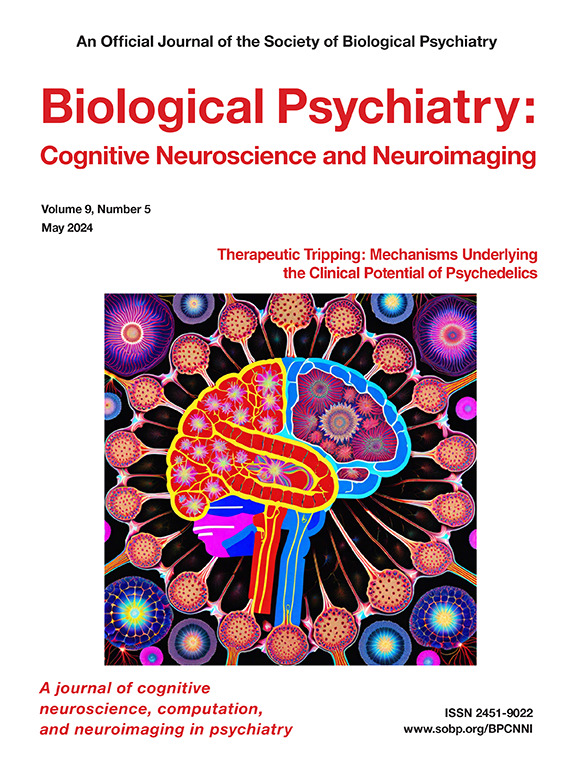From Confound to Clinical Tool: Mindfulness and the Observer Effect in Research and Therapy
IF 5.7
2区 医学
Q1 NEUROSCIENCES
Biological Psychiatry-Cognitive Neuroscience and Neuroimaging
Pub Date : 2025-04-01
DOI:10.1016/j.bpsc.2025.01.012
引用次数: 0
Abstract
The observer effect (OE), the idea that observing a phenomenon changes it, has important implications across scientific disciplines involving measurement and observation. While often viewed as a confounding variable to control for, this paper argues that the OE should be seriously accounted for, explored, and systematically leveraged in research and clinical settings. Specifically, mindfulness practices that cultivate present-moment, nonjudgmental awareness are proposed as a platform to account for, explore, and intentionally harness the OE. In research contexts, mindfulness training may allow participants to provide more precise self-reports by minimizing reactive biases that perturb the observed phenomena. Empirical evidence suggests that mindfulness enhances interoceptive awareness and reduces automatic judgment, potentially increasing measurement sensitivity, specificity, and validity. Clinically, psychotherapies often aim to make unconscious patterns explicitly observable to the client, capitalizing on the transformative potential of observation. Mindfulness directly cultivates this capacity for meta-awareness, allowing individuals to decenter from rigid cognitive-emotional patterns fueling psychopathology. Rather than avoiding unpleasant experiences such as cravings or anxiety, mindfulness guides individuals to simply observe these phenomena, reducing identification and reactivity. Mindfulness practices may leverage components of the OE, facilitating lasting psychological change. To further study the OE, developing an OE index to code observer influence is proposed. Overall, this paper highlights the ubiquity of the OE and advocates developing methods to intentionally account for and apply observer influences across research and therapeutic contexts.
从困惑到临床工具:研究与治疗中的正念与观察者效应。
观察者效应(OE),即观察一种现象会改变它的观点,在涉及测量和观察的科学学科中具有重要意义。虽然通常被视为需要控制的混淆变量,但本文认为OE应该在研究和临床环境中认真考虑、探索和系统地利用。具体来说,正念练习培养当下,非判断意识被提议作为一个平台来解释,探索和有意地利用OE。在研究背景下,正念训练可以通过最小化干扰观察现象的反应性偏见,让参与者提供更精确的自我报告。经验证据表明,正念增强了内感受性意识,减少了自动判断,潜在地提高了测量的灵敏度、特异性和有效性。在临床上,心理治疗的目标通常是让客户明确地观察到无意识的模式,利用观察的转化潜力。正念直接培养这种元意识的能力,允许个人从助长精神病理的僵化的认知-情感模式中“去中心化”。而不是避免不愉快的经历,如渴望或焦虑,正念引导个人简单地观察这些现象,减少识别和反应。正念练习可以利用OE的组成部分,促进持久的心理变化。为了进一步研究OE,提出了建立“观测器效应指数”来编码观测器的影响。总的来说,本文强调了OE的普遍性,并提倡开发方法来有意地解释和应用研究和治疗背景下的观察者影响。
本文章由计算机程序翻译,如有差异,请以英文原文为准。
求助全文
约1分钟内获得全文
求助全文
来源期刊

Biological Psychiatry-Cognitive Neuroscience and Neuroimaging
Neuroscience-Biological Psychiatry
CiteScore
10.40
自引率
1.70%
发文量
247
审稿时长
30 days
期刊介绍:
Biological Psychiatry: Cognitive Neuroscience and Neuroimaging is an official journal of the Society for Biological Psychiatry, whose purpose is to promote excellence in scientific research and education in fields that investigate the nature, causes, mechanisms, and treatments of disorders of thought, emotion, or behavior. In accord with this mission, this peer-reviewed, rapid-publication, international journal focuses on studies using the tools and constructs of cognitive neuroscience, including the full range of non-invasive neuroimaging and human extra- and intracranial physiological recording methodologies. It publishes both basic and clinical studies, including those that incorporate genetic data, pharmacological challenges, and computational modeling approaches. The journal publishes novel results of original research which represent an important new lead or significant impact on the field. Reviews and commentaries that focus on topics of current research and interest are also encouraged.
 求助内容:
求助内容: 应助结果提醒方式:
应助结果提醒方式:


